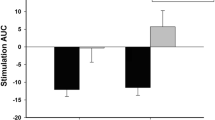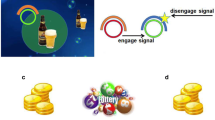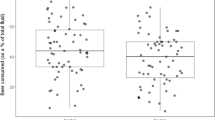Abstract
Rationale
Studies have shown that expectations of alcohol-induced impairment can produce adaptive responses to alcohol that reduce the degree of behavioral impairment displayed. However, compensatory effects have been variable for cognitive and psychomotor tasks.
Objectives
Using a model-driven approach to understanding behavioral control, the present study examined compensatory and impairment effects following the expectation and actual administration of alcohol on the ability to inhibit and activate behavior.
Methods
Social drinkers (N=17) performed a cued go/no-go task that required quick responses to go targets and inhibition of responses to no-go targets under four conditions: no treatment, alcohol expectancy (placebo), 0.45 g/kg alcohol, and 0.65 g/kg alcohol.
Results
Inhibitory and activational aspects of behavioral control were impaired by both active doses of alcohol. Alcohol slowed response activation and increased failures to inhibit responses in a dose-dependent manner. Subjects also displayed a small, but statistically significant, compensatory improvement in inhibitory control in response to the expectation of alcohol. Moreover, individual differences in the compensatory response were related to differences in alcohol impairment. Those who displayed greater compensatory responses to placebo displayed the least impairment in response to alcohol.
Conclusions
By modeling behavioral control as the net effect of countervailing activational and inhibitory influences, the study suggests that fundamental mechanisms of control might not display uniform compensatory reactions to alcohol-related cues. Greater consideration of how alcohol-related expectancies shape behaviors under the drug should lead to a better understanding of individual differences with respect to risk for alcohol abuse.




Similar content being viewed by others
References
Abroms BD, Fillmore MT, Marczinski CA (2003) Alcohol-induced impairment of behavioral control: effects on the alteration and suppression of prepotent responses. J Stud Alcohol 64:687–695
American Psychiatric Association (1994) Diagnostic and statistical manual of mental disorders, 4th edn. Author, Washington, DC
Assefi SL, Garry M (2003) Absolut (R) memory distortions: alcohol placebos influence the misinformation effect. Psychol Sci 14:77–80
Barkley RA (1997) Behavioral inhibition, sustained attention, and executive functions: constructing a unifying theory of ADHD. Psychol Bull 121:65–94
Beirness D, Vogel-Sprott M (1984) Alcohol tolerance in social drinkers: operant and classical conditioning effects. Psychopharmacology 84:393–397
Carpenter JA (1962) Effects of alcohol on some psychological processes. Q J Stud Alcohol 23:274–314
Connors G, Maisto S (1980) Effects of alcohol, instructions, and consumption rate on motor performance. J Stud Alcohol 41:509–517
Fillmore MT (2001) Cognitive preoccupation with alcohol and binge drinking in college students: alcohol-induced priming of the motivation to drink. Psychol Addict Behav 15:325–332
Fillmore MT (2003) Drug abuse as a problem of impaired control: current approaches and findings. Behav Cogn Neurosci Rev 2:179–197
Fillmore MT, Vogel-Spott M (1992) Expected effect of caffeine on motor performance predicts the type of response to placebo. Psychopharmacology 106:209–214
Fillmore MT, Vogel-Sprott M (1998) Behavioral impairment under alcohol: cognitive and pharmacokinetic factors. Alcohol Clin Exp Res 22:1476–1482
Fillmore MT, Vogel-Sprott M (1999) An alcohol model of impaired inhibitory control and its treatment in humans. Exp Clin Psychopharmacol 7:49–55
Fillmore MT, Vogel-Sprott M (2000) Response inhibition under alcohol: effects of cognitive and motivational conflict. J Stud Alcohol 61:239–246
Fillmore MT, Weafer J (2004) Alcohol impairment of behavior in men and women. Addiction 99:1237–1246
Fillmore MT, Carscadden JL, Vogel-Sprott M (1998) Alcohol, cognitive impairment and expectancies. J Stud Alcohol 62:174–179
Holloway FA (1995) Low-dose alcohol effects on human behavior and performance. Alcohol Drugs Driv 11:39–56
Hull JG, Bond CF (1986) Social and behavioral consequences of alcohol consumption and expectancy: a meta-analysis. Psychol Bull 99:347–360
Koelega HS (1995) Alcohol and vigilance performance: a review. Psychopharmacology 118:233–249
Kucera H, Francis WN (1967) Computational analysis of present-day American english. Brown University Press, Providence, RI
Lapp WM, Collins LR, Zywiak WH, Izzo CV (1994) Psychopharmacological effects of alcohol on time perception: the extended balanced placebo design. J Stud Alcohol 55:96–112
Logan GD (1994) On the ability to inhibit thought and action: a user’s guide to the stop-signal paradigm. In: Dagenbach D, Carr TH (eds) Inhibitory processes in attention, memory, and language. Academic, San Diego, CA
Logan GD, Cowan WB (1984) On the ability to inhibit thought and action: a theory of an act of control. Psychol Rev 91:295–327
Lyvers M (2000) “Loss of control” in alcoholism and drug addiction: a neuroscientific interpretation. Exp Clin Psychopharmacol 8:225–249
Marczinski CA, Fillmore MT (2003a) Pre-response cues reduce the impairing effects of alcohol on the execution and suppression of responses. Exp Clin Psychopharmacol 11:110–117
Marczinski CA, Fillmore MT (2003b) Dissociative antagonistic effects of caffeine on alcohol-induced impairment of behavioral control. Exp Clin Psychopharmacol 11:228–236
Marczinski CA, Fillmore MT (2005) Alcohol increases reliance on cues that signal acts of control. Exp Clin Psychopharmacol 13:15–24
Marlatt GA, Rohsenow D (1980) Cognitive processes in alcohol use: expectancy and the balanced placebo design. In: Mello NK (ed) Advances in substance abuse. J.A.I. Press, Greenwich, CT, pp 159–199
McClelland JL, Rumelhart DE (1981) An interactive activational model of context effects in letter perception: part I. An account of basic findings. Psychol Rev 88:375–407
Miller J, Schaffer R, Hackley SA (1991) Effects of preliminary information in a go versus no-go task. Acta Psychol 76:241–292
Nagoshi CT, Noll RT, Wood MD (1992) Alcohol expectancies and behavioral and emotional responses to placebo versus alcohol. Alcohol Clin Exp Res 16:255–260
Rimm DC, Sininger RA, Faherty JD, Whitley MD, Perl MB (1982) A balanced placebo investigation of the effects of alcohol vs. alcohol expectancy on simulated driving behavior. Addict Behav 7:27–32
Schneider W, Eschman A, Zuccolotto A (2002) E-prime user’s guide. Psychology Software Tools Inc, Pittsburgh
Schuckit MA (1994) Low level of response to alcohol as a predictor of future alcoholism. Am J Psychiatr 151:184–189
Sdao-Jarvie K, Vogel-Sprott M (1991) Response expectancies affect the acquisition and display of behavioral tolerance to alcohol. Alcohol 8:491–498
Selzer ML, Vinokur A, Van Rooijen L (1975) A self-administered short version of the Michigan Alcoholism Screening Test (SMAST). J Stud Alcohol 36:117–126
Siegel S (1975) Evidence from rats that morphine tolerance is a learned response. J Comp Physiol Psychol 89:498–506
Siegel S (1976) Morphine analgesic tolerance: its situation specifically supports a Pavlovian conditioning model. Science 193:323–325
Siegel S (1983) Classical conditioning, drug tolerance and drug dependence. In: Israel Y, Glaser BF, Kalant H, Popham RE, Schmidt W, Smart RG (eds) Research advances in alcohol and drug problems. Plenum Press, New York, pp 207–246
Solomon RL, Corbitt JD (1974) An opponent-process theory of motivation. Psychol Rev 81:119–145
Staiger PK, White JM (1988) Conditioned alcohol-like and alcohol-opposite responses in humans. Psychopharmacology 95:87–91
Subkov AA, Zilov GN (1937) The role of conditioned reflex adaptation in the origin of hyperergic reactions. Bulletin de Biologie et de Medecine Experimentale 4:294–296
Vogel-Sprott M (1992) Alcohol tolerance and social drinking: learning the consequences. Guilford Press, New York
Vogel-Sprott M, Fillmore MT (1999) Learning theory and research. In: Leonard KE, Blane HT (eds) Psychological theories of drinking and alcoholism. Guilford Press, New York, pp 292–327
Acknowledgements
This research was supported by Grant R01 AA12895 from the National Institute on Alcohol Abuse and Alcoholism and by Grant R01 DA14079 from the National Institute on Drug Abuse.
Author information
Authors and Affiliations
Corresponding author
Rights and permissions
About this article
Cite this article
Marczinski, C.A., Fillmore, M.T. Compensating for alcohol-induced impairment of control: effects on inhibition and activation of behavior. Psychopharmacology 181, 337–346 (2005). https://doi.org/10.1007/s00213-005-2269-4
Received:
Accepted:
Published:
Issue Date:
DOI: https://doi.org/10.1007/s00213-005-2269-4




